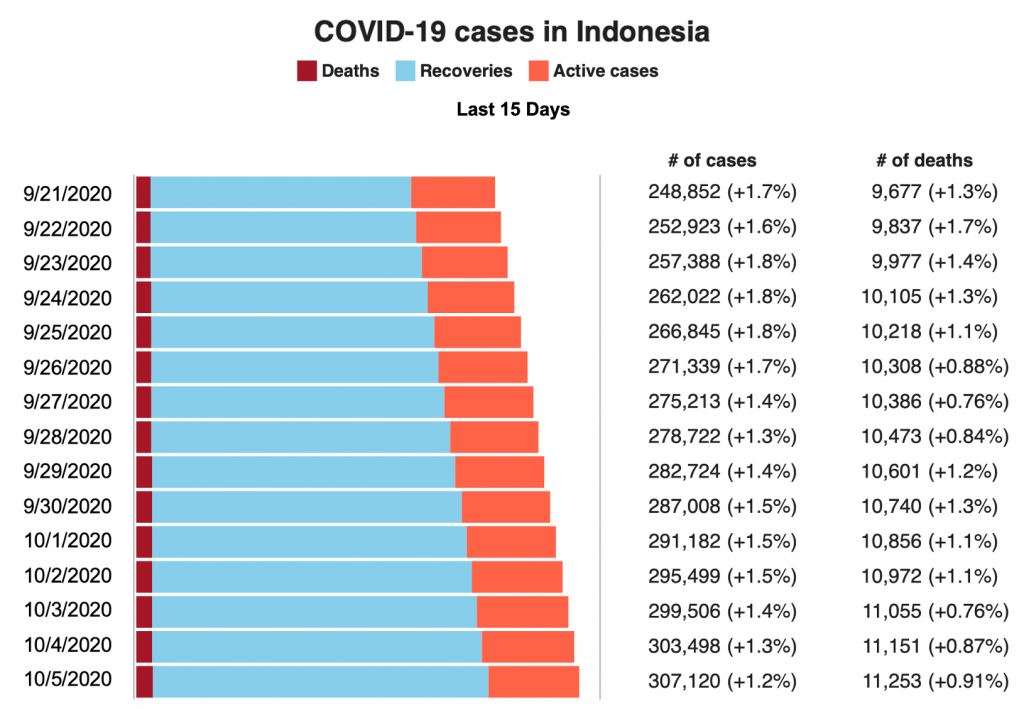Indonesia Corona Virus Update #32 October 5, 2020
Cumulative number of reported cases: 307,120 (as of October 5 )
11,253 Deaths
232,593 Recoveries
Rupiah to US$14,867
Jakarta Stock Exchange Index: 4958

Overview
Growth in active COVID 19 infections (total cases less recoveries and fatalities) slowed nationally to 2% week-on-week, down for 6%. Cumulative case national growth rate fell to 9%. West Java’s fell, week-on-week, to 13%, below last week’s high of 25%.
The West Java administration has extended large-scale social restrictions (PSBB) in Bogor, Depok and Bekasi (Bodebek) until Oct. 27 while Jakarta’s PSBB restriction is currently set to expire on October 11. Self-isolation centers in Jakarta have started to fill up as the number of COVID-19 cases continues to rise. In response, the city administration has prepared other locations as self-isolation centers, which are free to use.
The Indonesian Institute of Sciences (LIPI) and prominent Muslim groups (NU, Muhammadiyah) have urged the government to delay simultaneous regional elections scheduled for December over COVID-19 concerns.
The government released a plan to release vaccines. Initially about half of the population (103 million) would be administered a a vaccine developed by China’s Sinovac. State-controlled pharmaceutical firm Indofarma and its rival Kalbe Farma are introducing Remdesivir, a broad-spectrum antiviral drug from the American pharmaceutical firm Gilead Sciences to the Indonesian market, to support the government’s attempt to reduce the fatality from Covid-19 in the country.
Travel/Tourism
Indonesia is revising a rule banning foreigners from entering the country, as it discusses opening a travel corridor for essential business purposes from Singapore, according to Kompas. The government is opening travel corridors to allow businesspeople, experts, investors and state officials to enter the country, Kompas newspaper reported, citing Mr Yasonna Laoly, minister of law and human rights. Indonesia is in talks with Singapore, after agreeing to arrangements with the United Arab Emirates, South Korea and China. AICC is tracking this development with officials based in the US.
Economic
- Omnibus Bill Passed-Indonesia approved a law aimed at creating jobs and attracting investments. The day after, large pro labor demonstrations were held in protest. A group of global institutions investors representing $3 trillion wrote Indonesia’s President warning that the more relaxed provisions on environmental permits could harm the investment climate. Parliament passed the Omnibus Jobs Bill in a plenary meeting on Monday. It was previously set to hold the meeting on Oct. 8. The law that seeks to simplify and revise more than 70 existing regulations will overhaul the country’s labor rules, make it easier for companies to secure permits and ease foreign ownership requirements. Its passage sets the income tax from capital gains to 20%, while some dividend taxes will be exempted. Severance payments will be reduced from 32 to 19 weeks with the government picking up 6 months of wages. Other details regarding severance payments and the list of sectors open/closed to foreign investment are expecting in a series of implementing regulations and Presidential decrees. The Finance Ministry’s Fiscal Policy Agency head, Febrio Kacaribu, said on Oct. 2 that economic reforms through the bill, the creation of a sovereign wealth fund and the government’s investment, were expected to help support the economy in 2021. “We are pushing for these economic reforms so that investment is positive going forward, otherwise it would be hard to improve economic growth,” he told reporters. “We must start to chase investment-driven economic growth to have a large multiplier effect.” Sections of the bill that would have eased restrictions on for-profit education as well as foreign participation in teaching, administering, or owning schools was removed.
- State Budget Passed-The government and the House of Representatives passed the 2021 state budget bill into law on Tuesday, aiming at accelerating economic recovery amid the coronavirus pandemic and pushing for structural reforms to boost competitiveness. The 2021 State Budget Law targeted Indonesia’s economic growth to rebound to 5 percent next year, Finance Minister Sri Mulyani Indrawati said on Tuesday. This will follow an expected economic contraction of 0.6 to 1.7 percent this year, the first since the 1998 Asian financial crisis. “Economic growth in 2021 will be driven by gradual recovery in domestic consumption and we will push government spending to maintain people’s purchasing power amid the new normal,” she said. Controlling the pandemic will be the key factor to ensure growth, Sri Mulyani added.
- Batik Exports Grow– Exports of batik skyrocketed amid the COVID-19 pandemic, reaching nearly US$21.54 million during the January-July 2020 period, as compared to $17.99 million during the corresponding period last year, Industry Minister Agus Gumiwang Kartasasmita stated. The main markets include Japan, the United States, and Europe.
- Tesla Speculation– Reports have emerged suggesting that the Indonesian government has entered early discussions with American electric car maker Tesla about a possible major investment in the country, which happens to be a massive producer of nickel. The update was related by an Indonesian government official, who shared the information with news agency Reuters. The details of Tesla’s reported efforts to potentially engage in a venture in Indonesia are still unknown at this point.
(sources: International and Indonesia news media, Bali Update (from balidiscovery.com), Reformasi Weekly)





